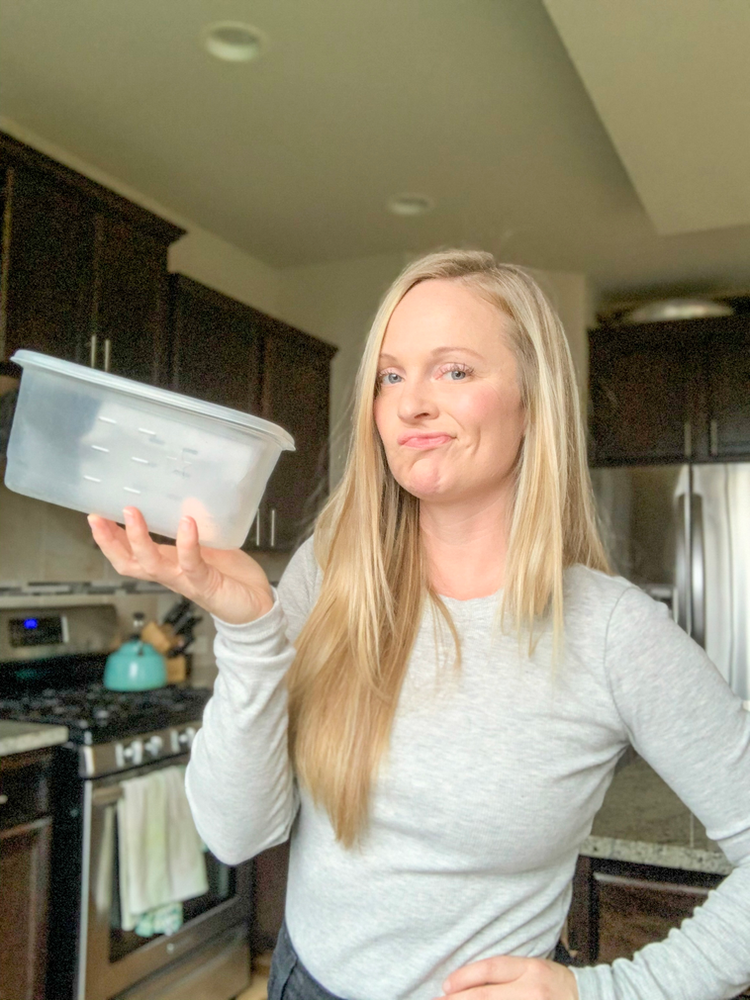The Scary Truth About Your Tupperware
January 14, 2021
I was working with a client the other week when the topic of plastic Tupperware containers came up and I think I may have scared her a little.
This client is going through my one on one gut health coaching program and we had come to the habit of limiting toxin exposure. We were talking about how much plastic we unintentionally ingest throughout the year and quickly the question arose- are my Tupperware containers bad?
The sad truth is we ingest so many mini doses of plastic, fragrances, and chemicals throughout the day that we don’t even notice them.
An occasional dose of them is no big deal, but when we are exposing ourselves to them every day, they start to bioaccumulate in our body.
As the toxins build up in our body, our body tries to send us signals that something isn’t right. We might experience seasonal allergies, new food sensitivities, skin irritation and breakouts, even headaches. The toxic build up goes even deeper though, disrupting our hormones, increasing our risk of cancer, creating long term inflammatory responses in our body, and throwing our gut out of balance.
Rather than scaring you away from any and all potentially toxic products, today I want to focus on one- BPA.
If you haven’t heard by now, BPA, or bisphenol A, is harmful to your health. BPA is most commonly found in plastic material (water bottles, food storage containers, lining of canned foods, etc.) and can cause any range of health issues from increased blood pressure and cancer risks to obesity and diabetes. Along with these scary health issues, BPA can affect the permeability of your gut lining, leading to leaky gut.
Leaky gut doesn’t sound that threatening when compared to cancer, but it is a condition that slowly affects nearly every aspect of your health. It causes chronic inflammation, autoimmune conditions, digestive issues, colon cancer, anxiety and depression, and metabolic diseases. Leaky gut is no joke.
So how do you minimize your exposure to BPA in a world where plastic is EVERYWHERE and, frankly, unavoidable? Start small.
Here are three things you can do to minimize your exposure to BPAs~

1. Swap Out Plastic Food Containers
For the next week, pay attention to the amount of plastic your food comes in contact with. Take out containers, straws, and plastic cutlery abound when you take something to go, and even when you are batch cooking for the week (go you!) your food might be kept in plastic containers. Plastic water bottles, frozen meal containers, even frozen blueberries are in plastic bags! Yikes! It’s a lot. And if I’m being real, you most likely won’t become plastic free anytime soon.
Start small. Swap out your plastic Tupperware containers with glass containers. When we place warm food in plastic, BPA filled containers, toxins from the containers leach into our food. This is really bad as these toxins are endocrine disruptors, mimicking our hormones and creating hormonal and gut imbalances. Instead, place your newly cooked/warm food, or food you will be warming up, into glass containers. You won’t have to worry about unwanted toxins seeping into your food.
Here is my favorite glass container set!
Makes sure to recycle or donate your old plastic containers, or if you want to keep them, use them for meals that stay cold (salads, sandwiches, etc.) or as storage for other things around the house like your batteries, tools, or (non-toxic) nail polish!
Lastly, under no circumstances do you want to microwave a meal that is in a plastic container, even if it says it’s microwave safe. That safety note means that it won’t melt in the microwave, it isn’t telling you that it is safe from leaking toxin into your food.
2. Buy Cans and Plastic That Say BPA Free
The plastic lining in canned foods has had BPA hiding in it for decades. Fortunately, now that it is on consumer radar, companies have started going BPA free with their cans. This is nearly always advertised on their cans as it’s good advertising. When buying anything in a can, from beans to tomato sauce, make sure it has the BPA free sticker.
When buying something that is plastic and will touch your food, be sure that it is BPA free.
3. Invest in a Reusable Water Bottle
60 million single use water bottles are used every day in America. Let that sink in. Not only is that devastating for the environment, it is bad for your health. With every bottle of water you drink from a flimsy plastic bottle, you are ingesting some plastic.
If you haven’t already, opt for a reusable water bottle and get in the habit of refilling it throughout the day. Heck, this could be your New Year goal if you are still looking for one!
I like to go with stainless steel water bottles and always make sure that it is BPA free. My favorite reusable water bottle is ” target=”_blank” rel=”noopener”>Hydroflask!
Will unhealthy toxins leach into my Tupperware set from household chemicals stored on the floor in the same closet?
Hi Susanne,
They shouldn’t, but I’d definitely recommend storing them in different areas, or swapping out your toxic chemicals, just to be safe!